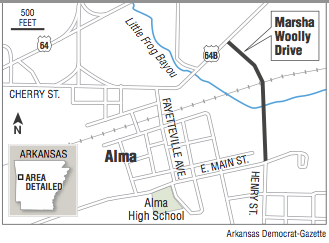ALMA -- A new bridge over the Union Pacific Railroad tracks through Alma was dedicated Tuesday, officially named for the late Marsha Woolly, a local educator and public servant who sparked the movement to create the span.
"Through her efforts and many others, we have this great overpass and this great avenue to get in and out of Alma," longtime Assistant School Superintendent Ronnie Newton said during a dedication ceremony at the foot of the 485-foot span.
Speaking at Tuesday's ceremony were Lt. Gov. Tim Griffin, Attorney General Leslie Rutledge, and representatives of U.S. Sens. John Boozman and Tom Cotton and of U.S. Reps. Steve Womack and Bruce Westerman. Several area legislators and local officials were in the audience of about 50 people.
Woolly, who died in 2012 at age 62, worked for 36 years in the Alma school system as a teacher and principal. She served more than 20 years on the Alma City Council and two terms on the Crawford County Quorum Court.
Newton and others praised Woolly for her work to ensure the safety of schoolchildren who crossed the tracks in buses daily. The bridge also will facilitate traffic flow in downtown Alma, which came to a halt every time a train rumbled through town.
Mayor Keith Greene said the railroad's effect on traffic has been a factor in the city's 145-year history.
Woolly's widower, School Superintendent David Woolly, said the effort to develop the overpass started about 40 years ago with an accident at a railroad crossing on Fayetteville Avenue that killed a family.
The bridge project, which included the span and relocating Arkansas 162 north to meet U.S. 64, cost $9.6 million, according to Arkansas Highway and Transportation Department District Engineer Chad Adams. Construction began on Dec. 14, 2015, led by primary contractor Forsgren Inc. of Fort Smith.
The project was paid for with state and federal funds and local matching money, Adams said. Greene said the city paid about 25 percent of the cost and that it took Alma about eight years to set aside enough money to meet its share.
"When you're a poor city, it takes a long time to save up your part," he said.
NW News on 07/12/2017

